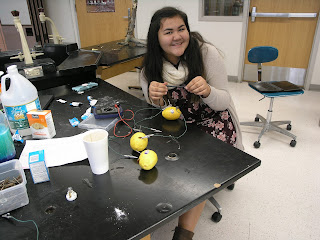In our Chemistry, Physical Science, and 7th Grade Science classes, we are working heavily on science projects. The students have designed their own projects and experiments and will be collecting their own data. In Physical Science, we have experiments ranging from lemon batteries, Alkaseltzer lava lamps, animal skull identification, music tastes and their relation to age and gender, popsicle stick engineering, ideal tastes of soda, angles to shoot a basketball from various spots on the court, and dissipation of energy from a bouncing basketball. In Chemistry, the students are working on factors affecting rabbits' ability to navigate a maze, chemical extraction of potato starch, lipstick and makeup chemicals, ideal saturation of salt in icewater to lower the temperature, ink chemicals, creating fuse lines, and other projects. Our 7th grade projects range from designing an aquarium and testing different aspects of fish habitat, building an indoor tornado out of dry ice, and ma




